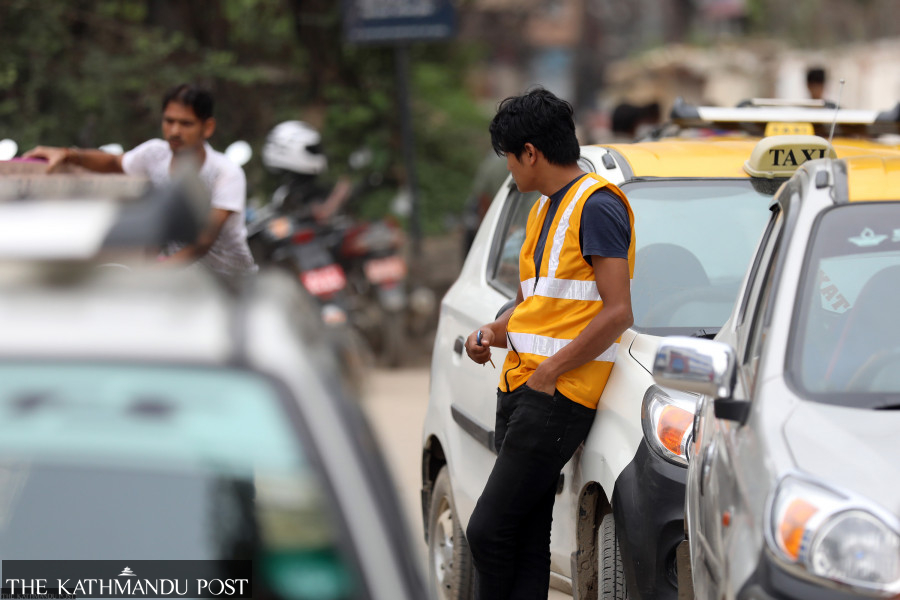Money
Audit report says ride-hailing companies operating illegally
There are 25 such companies operating in Nepal using GPS and digital platforms but none of them is registered.
Krishana Prasain
Ride-hailing companies are proliferating in Nepal and they have been generating high revenues; but they are not registered, and nor do they pay taxes, says a recent report of the Auditor General.
According to the 60th annual report of the Auditor General unveiled recently, international ride-hailing service inDrive has been arranging 29,300 rides daily and has an annual turnover of Rs2.11 billion. But it is operating informally, the report said.
United States-based inDrive launched in Nepal in April 2022. It has more than 150 million downloads and operates in 47 countries.
As per the audit report, there are 25 ride-hailing companies in Nepal using the Global Positioning System (GPS) and digital platforms, but none of them is registered for what they are currently doing.
“The government has failed to bring ride-hailing companies into a legal system,” the report said, adding that operating without registering with the Department of Transport Management was against the law.
The audit report says that carrying fare-paying passengers in a vehicle registered for private use is illegal. “The vehicle must be registered, operated, managed and inspected as per the law,” the report said.
In January 2019, the government cracked down on ride-hailing platforms like Tootle and Pathao, but public pressure forced it to back down because the ride-hailing apps had changed the way Nepalis travelled.
The ride-hailing apps allowed travellers to call a vehicle conveniently, freeing them from having to haggle with the often grudging drivers of traditional taxis.
In February 2020, the Patan High Court ordered the government to regulate ride-hailing services.
Bagmati province declared ride-hailing services legal in June 2022, but it did not issue any guidelines or policy. Ride-hailing companies were permitted to operate mobile apps by registering with the Transport Department.
European super app Bolt, which offers mobility services across Europe and Africa, started a pilot service in Kathmandu in March.
“We received a letter from the Office of the Auditor General recently, but the issues do not come under our jurisdiction. It is the work of Bagmati province,” said Ishwori Datta Paneru, information officer at the Department of Transport Management. “Moreover, the law does not have a provision for registering such ride-hailing companies,” he said.
Some ride-hailing companies may have registered with the Department of Industry, which is mandatory for all, but that doesn’t allow them to do business without paying taxes, officials said.
“The Bagmati Province Transportation Office requires ride-hailing companies to be registered, but there is confusion whether the federal government or the provincial government should deal with it,” Paneru said.
“That’s why the Office of the Auditor General has dispatched a letter to the department. We have already replied to it and other concerned government offices about the issue.”
The Motor Vehicles and Transport Management Act 1993 prohibits operating public transportation without registering as a transportation service with the Department of Transportation. The law also forbids vehicle owners from using their vehicles for other purposes than the declared purpose.
The audit report says that ride-hailing companies have been violating the fare schedule approved by the Ministry of Transportation of Bagmati province. The flagdown fare is Rs75 for taxis and Rs30 for motorcycles.

Ride-hailing companies are collecting insurance premiums of Rs2 for taxis and Rs1.75 for motorcycles from their passengers. They have been operating motorcycles by determining their own fares. A ride-hailing company’s app is being used 150,000 times daily, according to the report.
Despite the provision of passenger insurance in the law, ride-hailing companies have been charging Rs2 per ride illegally, which translates into Rs30 million annually, the audit report said.
“All these issues can be controlled through registration, approval and regulation,” the report said.
“The operation of ride-hailing companies is good, especially in our country where public transportation is a total mess; but it needs to be done as per the rules so that consumers do not get cheated,” said Prem Lal Maharjan, president of the National Consumer Forum.
“There are many ride-hailing services which are operating illegally as there are many loopholes in the system,” Maharjan said. “From data privacy to the cost of a ride, everything needs to be regulated by introducing laws otherwise it’s fraudulent business,” he said.
Asheem Man Singh Basnyat, managing director of Pathao Nepal, said that not only international ride-hailing services, but domestic ride-hailing services too were operating against the law.
“The government is losing a huge amount of revenue. We hope that the government will take action against those companies that are providing ride-hailing services without being registered,” Basnyat said.
“The companies which are operating legally cannot compete with such companies operating illegally. The implementation of the law is weak in Nepal, so investors look for loopholes in the laws. If foreign investors come to know that companies can be operated illegally in Nepal, it will be hard to bring foreign direct investment,” Basnyat said.
The app-based companies which do not charge any commission from riders and do not have a representative office in the country make money by selling customer data, insiders said.
Such companies do not assure data privacy, ride safety or insurance, and customers have nowhere to complain, they said.
The Supreme Court has declared that customers must receive insurance coverage, but it has not fixed the insurance amount.
Basnyat says operating off-line rides goes against consumer rights and creates safety issues too.
According to Raju Aryal, information officer of the Transportation Management Office, Hetauda, Bagmati province, a draft of the guidelines to regulate ride-hailing companies is being prepared.
“It has been delayed because of frequent changes in government,” he said.




 9.51°C Kathmandu
9.51°C Kathmandu















